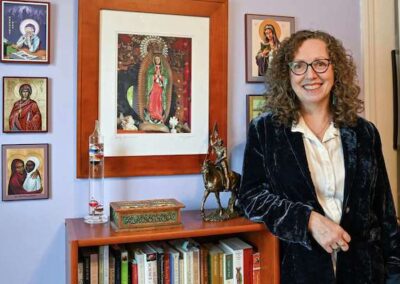This is my OSV Daily Take post from today. Given the devastation in Haiti, I thought it was important to share this more newsy post on Not Strictly Spiritual.
By Mary DeTurris Poust
Bishop Thomas Wenski of Orlando, Florida, has deep and strong ties to the Haitian community in both this country and abroad. Before becoming Bishop of Orlando, he served briefly in Haiti and later was director of the Pierre Toussaint Haitian Catholic Center in Miami and pastor of three Haitian parishes in the Archdiocese of Miami. Fluent in Haitian Creole, the bishop took time away from meetings related to the Haitian earthquake crisis, for an email interview with Our Sunday Visitor. Here are the bishop’s thoughts on the current situation in Haiti and his hopes for the country’s future.
OSV: Right now people are focusing on the immediate crisis in Haiti following the devastating earthquake. Can you give us a broader perspective, putting this crisis into the context of Haitian life before the earthquake?
Bishop Wenski: Life in Haiti was always hard for the majority of its population, most of whom live on less than $2 a day. However, the earthquake hit an area of Haiti where a third of its population of 8 million-plus people live — Port-au-Prince and vicinity. So, it’s really unprecedented. With the high mortality rates, it is hard to imagine one Haitian family not immediately affected.
OSV: Relief organizations are being flooded with donations for Haiti right now. Is there the possibility that relief aid will help Haitians finally build a better future for themselves and their children, or are the issues there — poverty, government instability, etc. — too great?
Bishop Wenski: Hopefully, those in charge of leading the recovery will get it right. In the short term, removal of debris and rebuilding will provide much needed employment; however, in the long term, the now destroyed infrastructure (in the best of times fragile) will need to be rebuilt: hospitals, schools, churches, utilities like electricity, water and communications.
OSV: Where must the rebuilding effort begin in order to be most effective?
Bishop Wenski: First, since much of Port-au-Prince is destroyed, many families should be relocated to the provincial towns and villages where many in Port-au-Prince have their roots. To do that, adequate resources also have to be directed to these areas even though they might not have been directly affected by the earthquake. Then Port-au-Prince has to be “redesigned” and “re-imagined” so that it can emerge from its ashes better than before.
OSV: How is the devastation from the earthquake likely to affect the everyday lives of Haitians for the weeks, months, years to come?
Bishop Wenski: A child who loses a mother or father because of the earthquake will be affected forever; a mother that cannot give a decent burial to her child killed in the earthquake will carry that with her for the rest of her life. This earthquake will be the ecological event of the 21st Century – and it will shadow Haitians for generations to come.
OSV: In your statement (HERE), you talk about the need for President Obama to give Haiti Temporary Protected Status (TPS). Can you explain the importance of this and what it could mean not only for Haitians nationals living in this country but their families back home?
Bishop Wenski: There is a discrete number of Haitians in the United States “out of status.” They face deportation, which would only complicate the humanitarian situation on the island. TPS would allow them to stay for the time being and to work legally, which would be of immense value to them as well as to their loved ones back home.
OSV: How is this crisis going to impact the Haitian community here in the United States?
Bishop Wenski: Almost every Haitian I’ve talked to in the U.S. since the earthquake has family members and friends in Haiti. Right now many are anxious awaiting news of the fate of these loved ones. Haitians are a resilient people. They will survive, but the pain of loss – and the extent of loss – will leave a permanent mark on this community. Hopefully, even in evil God can bring about good. The solidarity of the international community hopefully will hearten Haitians here and in Haiti; and this tragedy has affected Haitians of all social and economic classes. Hopefully this tragedy will bring about a new national unity among the Haitian people who have been long divided over class and or political lines. And for us in the United States, let me say that geography has made the U.S. and Haiti neighbors; now is the time that we show that we also are truly brothers and sisters.







